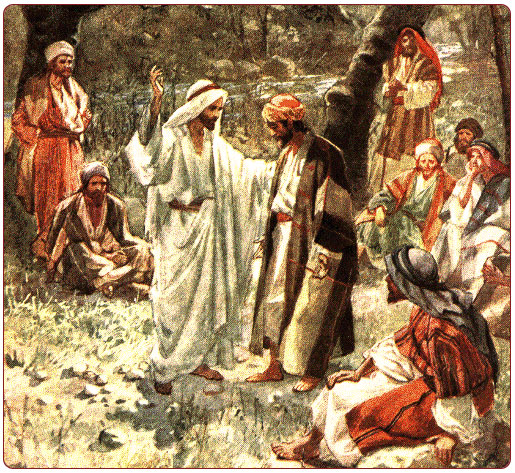 Proper 20B
Proper 20B Sept. 20, 2009
Proverbs 31:10-31
Psalm 1
James 3:13-4:6
Mark 9:30-37
There are a lot of myths about children: that they are helpless, self-centered, vulnerable, always happy, supremely innocent. There’s also that pop psychology talk about how we adults must get back to our "inner child."
The other side of the child myth is that they are violent, uncontrollable and incapable of moral reasoning – and must be tried and incarcerated as adults.
Myths like these are popular for good reason. There is some truth in them: children are dependent on adults for health and well-being, and many adults do carry with them the scars of a childhood damaged or robbed by cruel circumstance. Children do fly into violent rages and they often do not understand the consequences of their actions. But myths also can cloud reality, helping us see more of what we want to see that what really may be there.
I think that is part of the point Jesus is trying to make in the gospel. He tells the disciples -- again -- that he will suffer and die and -- again -- they deny it. They don't understand, Mark tells us, and they are afraid to ask Jesus what he means. But they must have been thinking about it somewhat, because they got into a conversation about who was the greatest. Jesus sits them down to teach them (and us!) a lesson: “Whoever wants to be first must be last of all and servant of all." (Not what the quarreling disciples want to hear.) And then he takes a child in his arms: "Whoever welcomes one such child in my name, welcomes me."
What is the importance of the child in what Jesus is trying to teach his friends?
In Jesus’ day, children were at the bottom of the bottom. They had no status or privilege, even within the family. For Jesus to use them as an example of what it means to follow Jesus, to follow the way of the cross, is to say that to be a disciple means to be as powerless and socially unimportant as a child. Rather than squabbling over who would be the greatest in the new realm of God, the disciples should model themselves on those who are powerless and insignificant. Jesus is deliberately shocking them.
What shocks us today by the example of a child? What is it about children today that might similarly shock and wake us up to what it means to follow Jesus?
Children don’t have a lot of control over what happens to them. Other people make their decisions and they are vulnerable to the wisdom or foolishness of the adults who care for them. If Jesus were using a child as an example for us, today, of discipleship, the shocking lesson for us might be that we have to give up control over the future, over what happens to us, that we would have to let go.
Wanting to control the future – to control God’s plans -- is part of the disciples' denial of Jesus' statements on suffering and death. They don't want to hear him say, "The Son of Man is to be betrayed into human hands." Who would want to hear that? I would not, but by denying it, out of fear or lack of understanding, I, too, would be betraying Jesus, for my denial would reveal that I would rather that God follow my plan for Jesus -- that we all live happily and not too controversially ever after -- than I would follow God's plan, which leaves far too much open to chance and danger.
When God became human in the person of Jesus, he opened himself to a world of chance and change, of arbitrariness and unpredictability -- to life on the streets -- to a world filled with danger, grief, sorrow, loss and, inevitably, suffering and death. Into this world God has poured hope. If we deny the suffering and death, Jesus tells his disciples, we lose the chance of experiencing the hope. Yet if we approach the world with the powerlessness of a child, we can live in that new reality, in that community of equals, where in our powerlessness we can know the true power of God.




.jpg)
.jpg)







.jpg)
